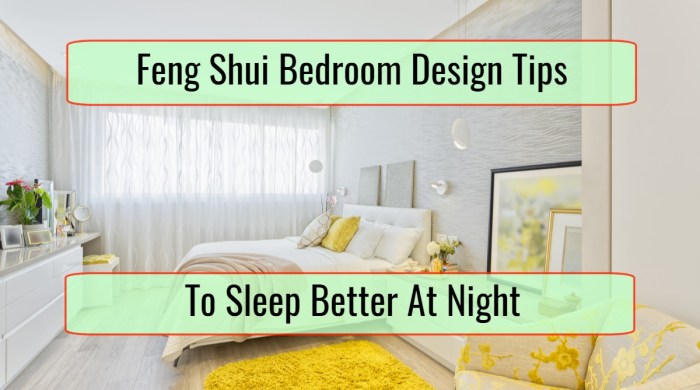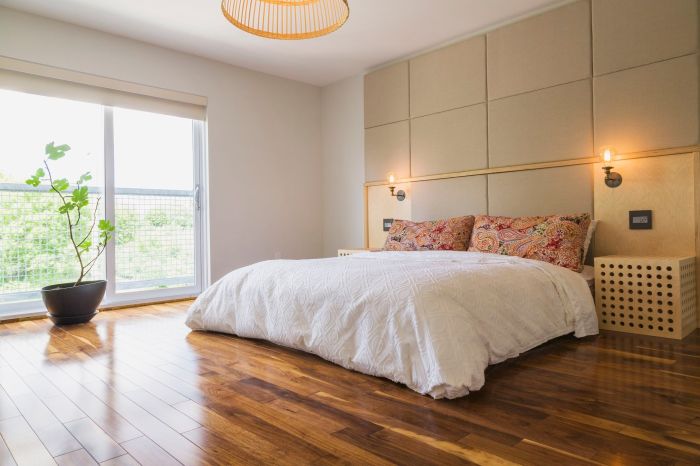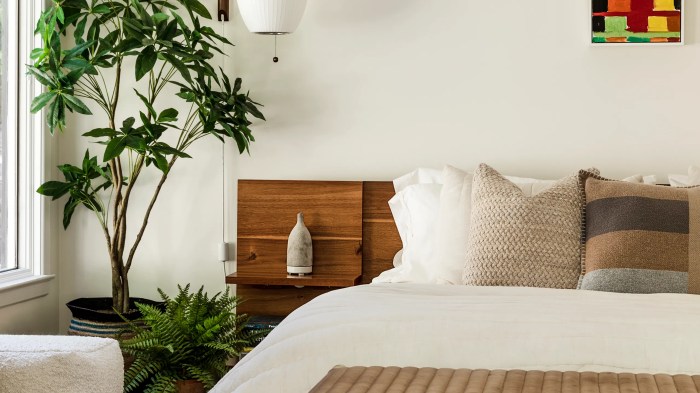Color Palette and Interior Design

Feng shui bedroom design – Creating a serene and energizing bedroom environment hinges significantly on the thoughtful selection of colors and the overall interior design. Feng shui principles guide us towards harmonious color palettes that promote relaxation and positive energy flow, contributing to a restful and rejuvenating sleep experience. The careful consideration of color impacts not only the visual appeal but also the subtle energetic vibrations within the space.Color impacts the energy of a bedroom profoundly, influencing mood and promoting either restful sleep or restless nights.
Certain colors are associated with specific elements in feng shui, each carrying unique energetic qualities. For instance, calming earth tones foster a sense of grounding and stability, while brighter hues can invigorate the space, albeit potentially disrupting sleep if overused. The key is balance and mindful selection.
Effects of Different Colors on Bedroom Energy
Earth tones, such as soft browns, creams, and muted greens, are generally considered auspicious for bedrooms. These colors are associated with the earth element in feng shui, representing stability, grounding, and security. They promote a sense of calm and tranquility, ideal for fostering restful sleep. In contrast, vibrant colors like reds and oranges, while stimulating, are generally not recommended for the primary sleeping area, as they can be overly energizing and disruptive to sleep patterns.
Blues and greens, associated with water and wood elements, respectively, can also be beneficial, evoking feelings of peace and serenity, but should be used in softer shades to avoid feeling too cold or sterile. A bedroom painted entirely in a deep blue, for example, might feel too cold and uninviting.
Auspicious Color Combinations for Bedrooms
Several color combinations are considered particularly auspicious in feng shui for bedroom design. Pairing a soft, muted green with a creamy beige, for instance, creates a harmonious balance between the wood and earth elements, promoting growth and stability. A combination of pale blues and soft greys can create a calming and serene atmosphere, ideal for relaxation and restful sleep.
The use of subtle accent colors can further enhance the design, but should always remain subordinate to the overall calming palette. For example, a touch of warm terracotta can add a sense of warmth and vitality without overwhelming the space. Avoiding harsh contrasts is key; the goal is a harmonious blend of colors that create a sense of peace and balance.
Mood Board: Calming Earth Tones and Natural Materials
Imagine a bedroom bathed in soft, natural light filtering through sheer linen curtains. The walls are painted in a gentle, warm beige, complemented by bedding in various shades of cream and taupe. The floor is covered in a natural jute rug, adding a textural element and a sense of warmth underfoot. The bed features a headboard crafted from light-colored wood, its smooth, slightly textured surface adding a touch of elegance.
Beside the bed, a small wooden nightstand holds a table lamp with a linen shade, casting a soft, ambient glow. A few strategically placed plants add life and vibrancy to the space, while natural fiber baskets provide storage and further enhance the organic aesthetic. The overall feel is one of calm, serenity, and understated elegance, reflecting the principles of feng shui and creating a haven for relaxation and restful sleep.
The textures are varied but harmonious: the smooth wood, the soft linen, the coarse jute, all contribute to a sensory experience that is both calming and engaging. The lighting is soft and diffused, avoiding harsh shadows and promoting a sense of peace and tranquility.
Furniture and Decor

Creating a harmonious and restful bedroom environment according to Feng Shui principles involves careful consideration of the furniture and decor you choose. The aim is to foster a sense of balance and promote positive energy flow, orQi*, throughout the space. The right pieces can enhance relaxation and sleep quality, while the wrong ones can disrupt this equilibrium.
Key Furniture Pieces for a Feng Shui Bedroom
Selecting furniture for a Feng Shui bedroom is about choosing pieces that support relaxation and promote a sense of calm. The bed, in particular, holds significant importance. Other pieces should be chosen with mindful consideration of their impact on the overall energy of the room.
- Bed: The bed is the most important piece of furniture in a Feng Shui bedroom. It should be sturdy, well-made, and positioned to command the room, ideally not directly facing the door. A headboard provides support and a sense of security. Avoid placing the bed directly under a window or against a wall shared with a bathroom.
- Nightstands: Two matching nightstands flanking the bed create balance and symmetry. They provide convenient surfaces for lamps, books, and other personal items. Avoid overcrowding them.
- Dresser or Wardrobe: A dresser or wardrobe provides storage for clothing and helps maintain order, a crucial aspect of Feng Shui. Opt for pieces that are well-organized and functional.
- Seating: A comfortable chair or small seating area can be beneficial if space allows. However, avoid placing it directly opposite the bed, as this can disrupt the energy flow.
Furniture to Avoid in a Feng Shui Bedroom
Certain furniture pieces can negatively impact the energy of a bedroom. These should be avoided or their placement carefully considered.
Feng shui bedroom design emphasizes creating a peaceful and balanced space conducive to restful sleep. For those seeking inspiration, incorporating elements from traditional bedroom design ideas can often complement feng shui principles, such as using natural materials and calming color palettes. Ultimately, the goal in both traditional and feng shui design is to create a haven that promotes relaxation and well-being.
- Oversized Furniture: Overly large furniture can make the room feel cramped and overwhelm the space, hindering the flow of Qi.
- Cluttered Furniture: Furniture that is cluttered with items creates a sense of disorder and disrupts the peaceful atmosphere.
- Broken or Damaged Furniture: Broken or damaged furniture represents stagnation and should be repaired or removed.
- Work Desk or Office Furniture: Bringing work into the bedroom can disrupt sleep and relaxation. Keeping the bedroom solely for rest and intimacy is crucial.
Mirrors in a Feng Shui Bedroom: Placement Guidelines
Mirrors can be powerful tools in Feng Shui, capable of both enhancing and disrupting the energy flow in a room. Their placement requires careful consideration. Improper placement can reflect energy outwards, preventing rest and relaxation, or reflect the bed, which is generally considered unfavorable.
- Ideal Mirror Placements:
- On a closet door, reflecting a well-organized space.
- On a wall opposite a window, reflecting natural light and expanding the sense of space.
- A small mirror on a dresser, used for practical purposes and not reflecting the bed.
- Non-Ideal Mirror Placements:
- Directly facing the bed, reflecting the sleeping occupants.
- Positioned where they reflect a chaotic or cluttered area.
- Placed directly opposite the door, reflecting energy away from the room.
Decor Items that Enhance or Obstruct Positive Energy, Feng shui bedroom design
Decorative items play a significant role in shaping the energy of a bedroom. Items that promote peace, tranquility, and harmony are preferred.
- Positive Energy Enhancers:
- Natural elements: Plants, crystals, wood, and stone bring a sense of grounding and calm.
- Soft lighting: Dim, warm lighting promotes relaxation.
- Calming colors: Soft blues, greens, and pastels create a peaceful atmosphere.
- Artwork depicting nature: Landscapes, flowers, or peaceful scenes can inspire tranquility.
- Meaningful personal items: A few cherished objects can add a personal touch without overwhelming the space.
- Negative Energy Obstructors:
- Clutter: Excessive items create disorder and disrupt energy flow.
- Sharp or angular objects: These can create a sense of tension and anxiety.
- Aggressive artwork: Violent or disturbing images should be avoided.
- Broken or damaged items: These represent stagnation and should be removed.
- Technology: Excessive technology can interfere with sleep and relaxation.
Lighting and Clutter Management: Feng Shui Bedroom Design

Proper lighting and effective clutter management are fundamental aspects of creating a harmonious and peaceful bedroom according to Feng Shui principles. These elements directly impact the flow of energy (Qi) within the space, influencing your sleep quality, emotional well-being, and overall sense of calm. A well-lit and organized bedroom promotes a sense of balance and tranquility, essential for a restorative and rejuvenating sleep experience.
The Importance of Proper Lighting in Feng Shui Bedrooms
In Feng Shui, lighting is not merely functional; it’s a crucial element in shaping the energy of a room. Different types of lighting create distinct atmospheres, influencing mood and promoting specific energies. Harsh, bright lighting can be jarring and disruptive, while soft, diffused light fosters relaxation and tranquility. The goal is to create a balanced lighting scheme that supports restful sleep and promotes a sense of peace.
Overly bright lights can be stimulating, making it difficult to fall asleep, while insufficient light can create a sense of stagnation and heaviness. A balanced approach is key.
Effective Clutter Management Techniques in Feng Shui
Clutter represents stagnant energy in Feng Shui, obstructing the free flow of Qi and hindering positive energy circulation. A cluttered bedroom can lead to feelings of anxiety, stress, and difficulty sleeping. Decluttering is therefore essential for creating a peaceful and harmonious sleeping environment. This involves not only removing unnecessary items but also organizing what remains in a way that promotes a sense of calm and order.
The process should be mindful and intentional, allowing you to release attachments to possessions that no longer serve you.
Clutter Solutions Table
| Clutter Type | Solution | Feng Shui Principle | Benefits |
|---|---|---|---|
| Clothes and Accessories | Organize closets and drawers; donate or discard unwanted items; use storage solutions like shelves and containers. | Decluttering and Organization | Reduces visual clutter, promotes a sense of calm, and frees up space. |
| Books and Papers | Create a designated reading area; organize bookshelves; file or discard unnecessary papers; utilize digital storage. | Commanding Position and Order | Reduces visual distractions, improves focus, and creates a more serene environment. |
| Cosmetics and Personal Care Items | Organize vanity or bathroom area; use trays and containers; discard expired products. | Organization and Cleanliness | Promotes a sense of order and hygiene, leading to a cleaner and more relaxing space. |
| Miscellaneous Items | Utilize storage boxes and containers; create designated storage areas; regularly purge items you no longer need or use. | Space Clearing | Reduces visual clutter, promotes a sense of order, and improves air circulation. |
Ideal Lighting Scheme for a Feng Shui Bedroom
The ideal lighting scheme for a Feng Shui bedroom incorporates three types of lighting: ambient, task, and accent. Ambient lighting provides overall illumination, creating a soft and diffused glow. This can be achieved with dimmable overhead lighting, wall sconces, or floor lamps emitting warm-toned light. Task lighting, such as bedside lamps, provides focused light for reading or other activities.
Accent lighting, such as strategically placed candles or small lamps, adds subtle highlights and creates a warm and inviting atmosphere. The placement of lighting is crucial; avoid harsh overhead lights directly above the bed. Instead, opt for softer, indirect lighting sources that create a calming and relaxing atmosphere.
FAQs
Can I use a Feng Shui mirror in my bedroom?
Mirrors can be beneficial in Feng Shui, reflecting light and creating a sense of spaciousness, but avoid placing them directly opposite the bed as this can disrupt sleep.
What are some common Feng Shui bedroom layout mistakes?
Common mistakes include placing the bed directly in line with the door (creating a “dead-end” energy flow), having the bed too close to the window (allowing energy to escape), or having a cluttered space.
How do I choose the right colors for my Feng Shui bedroom?
Earthy tones like greens, browns, and creams are generally recommended for relaxation. Avoid overly bright or stimulating colors.
What plants are good for a Feng Shui bedroom?
Peace lilies, snake plants, and spider plants are considered good choices due to their air-purifying qualities and calming presence. Avoid thorny or spiky plants.
